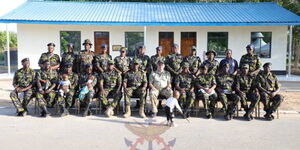July, known for its chilly weather, has become one of the coldest months in Kenya. With temperatures dropping below seven degrees during the night, many Kenyans are increasingly relying on electric home heaters to keep warm.
Over the years, electric home heaters have become more affordable, especially as many countries discourage the use of wood and jikos due to the potential risks they pose.
In Kenya, one can find heaters priced as low as Ksh1,600, while others, depending on their size and model, can cost over Ksh5,000.
Despite the advantages of using heaters, it is important to be aware of the associated risks and potential dangers they pose.
Dry Air
One of the most common mistake Kenyans make when using heaters is failing to use them alongside humidifiers.
When heaters are used in isolation, they can contribute to dry air in the room due to the heat they generate. This can lead to discomfort for the user, resulting in dry skin, lips, and eyes.
In some cases, prolonged exposure to dry air from heaters can even cause nosebleeds.
Fires
According to Emmanuel Otieno, a local electrician based in Nairobi's Kangemi estate, electric heaters can also pose a fire hazard in houses, similar to firewood and jikos.
Speaking to Kenyans.co.ke Otieno explained that these fires occur when the heat in a room becomes excessive and there are flammable materials present.
To prevent such incidents, Otieno advised homeowners to regulate the heat produced by electric heaters. Many heaters come with adjustable settings, allowing users to choose from low to high heat levels. It is recommended to keep the heaters at moderate or low settings to minimize the risk of overheating.
Furthermore, Otieno emphasised the importance of being present and attentive when using electric heaters. Having the heater in your presence allows you to monitor it closely and respond promptly to any signs of overheating or malfunctioning.
Conversely, another common mistake Kenyans make is placing a piece of clothing over the heater head. This mostly happens when Kenyans want their cloths such as handkerchiefs to dry faster. Such incidents lead to fires.
Homeowners also have a habit of placing heaters next to curtains, a tendency which electricians say is dangerous. Home owners are advised to place heaters in open places instead.
Kenyans should also avoid placing their feet - whether with or without socks- near the heaters.
Electric Shock
Users also risk getting shocked in case of faulty wires or poor handling of home appliances.
Some of the common instances when electric shocks are reported are situations when users hold the appliances with wet hands. The most affected age group are children who interact with water frequently when playing around the house.
It is always advisable to always place appliances out of the reach of children.
High Power Consumption
Just like other electronic devices such as ovens and shower heaters, room heaters consume a lot of electricity and increase the power bill.
Therefore, it is important to regulate the use of electronic heaters and use them only when necessary.
"For instance, it is not advisable to use heaters throughout the night. Just use it when it is necessary. When the room gets warm to your liking, you are better served by switching it off rather than having it on throughout the night," the electrician advised.
One can also check the voltage on the sticker as this will guide you on how to buy energy-saving ones.












